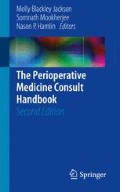Abstract
Nutrition assessment should be a routine part of any preoperative evaluation. Malnutrition is associated with increased rates of postoperative infection, impaired wound healing, and increased length of stay. The stress of surgery causes catecholamine and cortisol release, which results in a hypermetabolic state that can further exacerbate underlying malnutrition. Identifying patients with malnutrition and stratifying them according to severity of malnutrition allows for perioperative interventions that reduce surgical complications. In select cases, it may be beneficial to delay surgery for 5 to 7 days to optimize nutritional status to bolster the immune system and prepare the body for the systemic stress response to surgery.
In the perioperative and postoperative period, both well-nourished and malnourished patients benefit from interventions focused on optimizing nutritional state, including immunonutrition and minimization of time spent nil per os (NPO). Additionally, the consulting internist should be aware of recommendations regarding initiation of nutrition postoperatively, with a focus on early advancement of diet or enteral feeding.
Access this chapter
Tax calculation will be finalised at checkout
Purchases are for personal use only
References
Haydock DA, Hill GL. Impaired wound healing in surgical patients with varying degrees of malnutrition. JPEN. 1986;10(6):550–4.
Garth AK, Newsome CM, Simmance N, et al. Nutritional status, nutrition practices and post-operative complications in patients with gastrointestinal cancer. J Hum Nutr Diet. 2010;23(4):393–401.
Donald RA, Perry EG, Wittert GA, et al. The plasma ACTH, AVP, CRH and catecholamine responses to conventional and laparoscopic cholecystectomy. Clin Endocrinol. 1993;38(6):609–16.
White JV, Guenter P, Jensen G, et al. Academy Malnutrition Work Group; A.S.P.E.N. Malnutrition Task Force; A.S.P.E.N. Board of Directors. Consensus statement: Academy of Nutrition and Dietetics and American Society for Parenteral and Enteral Nutrition: characteristics recommended for the identification and documentation of adult malnutrition (undernutrition). JPEN. 2012;36(3):275–83.
Kondrup J, Allison SP, Elia M, et al. ESPEN guidelines for nutrition screening 2002. Clin Nutr. 2003;22(4):415–21.
Weimann A, Braga M, Harsanyi L, et al. ESPEN Guidelines on enteral nutrition: surgery including organ transplantation. Clin Nutr. 2006;25(2):224–44.
Miller KR, Wischmeter PE, Taylor B, et al. An evidence-based approach to perioperative nutrition support in the elective surgery patient. JPEN. 2013;37(39S):39–50S.
McClave SA, Kozar R, Martindale RG, et al. Summary points and consensus recommendations from the North American surgical nutrition summit. JPEN. 2013;37(1S):99–105s.
Marik PE, Zaloga GP. Immunonutrition in high-risk surgical patients: a systematic review and analysis of the literature. JPEN. 2010;34(4):378–86.
Peres Pimenta G, Aguilar-Nascimento JE. Prolonged preoperative fasting in elective surgical patients: why should we reduce it? Nutr Clin Pract. http://ncp.sagepub.com/content/early/2013/12/10/0884533613514277. Accessed 18 Dec 2013.
American Society of Anesthesiologists Committee. Practice guidelines for preoperative fasting and the use of pharmacologic agents to reduce the risk of pulmonary aspiration: application to healthy patients undergoing elective procedures: an updated report by the American Society of Anesthesiologists Committee on Standards and Practice Parameters. Anesthesiology. 2011;114(3):495–511.
Warren J, Bhalla V, Cresci G. Postoperative diet advancement: surgical dogma vs. evidence-based medicine. Nutr Clin Pract. 2011;26(2):115–25.
Enomoto TM, Larson D, Martindale RG. Patients requiring perioperative nutritional support. Med Clin N Am. 2013;97(6):1181–200.
Lewis SJ, Andersen HK, Thomas S. Early enteral nutrition within 24 h of intestinal surgery versus later commencement of feeding: a systematic review and meta-analysis. J Gastrointest Surg. 2009;13(3):569–75.
Martindale RG, McClave SA, Vanek VW, et al. Guidelines for the provision and assessment of nutrition support therapy in the adult critically ill patient: Society of Critical Care Medicine and American Society for Parenteral and Enteral Nutrition. Crit Care Med. 2009;37(5):1–30.
Author information
Authors and Affiliations
Corresponding author
Editor information
Editors and Affiliations
Rights and permissions
Copyright information
© 2015 Springer International Publishing Switzerland
About this chapter
Cite this chapter
Spector, T., Frank, L. (2015). Nutrition. In: Jackson, M.B., Mookherjee, S., Hamlin, N.P. (eds) The Perioperative Medicine Consult Handbook. Springer, Cham. https://doi.org/10.1007/978-3-319-09366-6_41
Download citation
DOI: https://doi.org/10.1007/978-3-319-09366-6_41
Published:
Publisher Name: Springer, Cham
Print ISBN: 978-3-319-09365-9
Online ISBN: 978-3-319-09366-6
eBook Packages: MedicineMedicine (R0)

